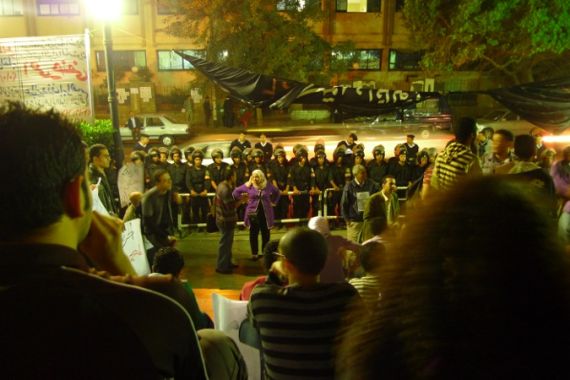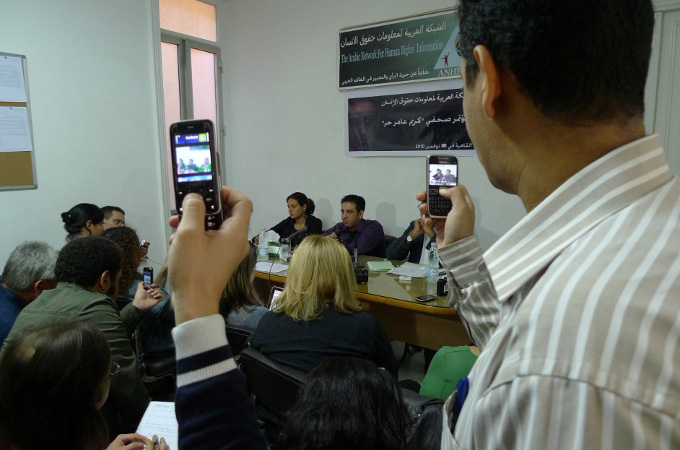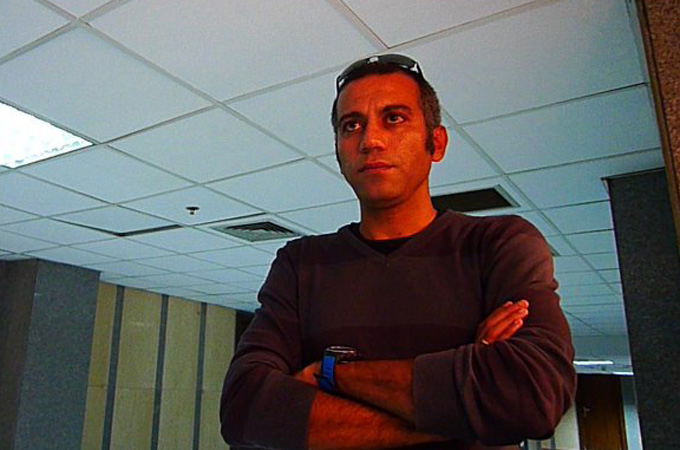When reporting becomes activism
In Egypt under emergency law, what could be considered free expression elsewhere can be cause for arrest.

 |
| Old and new media converged to cover the incarceration and eventual release of Kareem Amer, the first blogger to face trial for his online writings in Egypt [Evan Hill] |
On a Friday night in Cairo, two days before the country’s parliamentary election, a photographer for the Egyptian al-Masry al-Youm newspaper found himself briefly detained by police for covering an anti-torture protest.
Two days earlier, a group of demonstrators protesting the arrest of online journalist Yousef Shaaban were outnumbered by the battalion of riot police gathered to counter them in central Cairo.
On Sunday, reporters who attempted to photograph or film inside polling places during the vote were mostly met with complete refusal.
In a country where someone can be arrested for protesting and arrested for reporting about a protest, journalism has long been a form of activism, intentional or not. And since media platforms like Twitter and Facebook have proliferated, online blogging has assumed a place alongside student unions and street protests as a powerful and accepted outlet for political expression.
New media has been undeniably effective at uncovering abuses of authority in Egypt, where “emergency” national security laws presided over by president Hosni Mubarak for three decades have granted police and prosecutors sweeping powers. In 2007, blogger Wael Abbas became famous – and synonymous with Egyptian online activism – after he posted online video of police torturing a micro-bus driver, eventually resulting in the officers’ conviction.
But with such power come questions: Should bloggers push ideologies or strive to be unbiased? Can those who embrace political activism really make a difference with a 140-character tweet?
Regardless, the tools of online media have taken root in Egypt, and everyone from socialists to the Muslim Brotherhood are reaping the benefits.
Massive blog expansion
According to the Egyptian Cabinet Information and Decision Support Centre (IDSC), a kind of think tank for the executive branch, the rate at which Egyptians are creating new blogs has been increasing in recent years.
 |
| Hossam el-Hamalawy, who runs the popular 3arabawy blog, considers himself a ‘socialist’ activist |
Hossam el-Hamalawy, who runs the popular 3rabawy blog, says he has seen the community of online writers undergo a massive expansion in the five years since Egypt’s last parliamentary vote.
As media platforms have diversified, so have Egypt’s bloggers, Hamalawy said. Though Cairo, the capital, and Alexandria, the country’s second-largest city, remain the twin hearts of artistic and intellectual expression – and still the home to the greatest number of bloggers, according to IDSC data – writers have also sprouted up in more rural provinces, Hamalawy said.
Like some of his colleagues, Hamalawy is perfectly comfortable discussing his personal political persuasion and how it affects his work. A self-described “socialist,” he views social media as a useful tool for spreading the word about protests and government abuses.
The issue of bias is not complicated, in Hamalawy’s eyes: We’re all biased.
“The mainstream media is clearly biased,” he said, adopting the voice of a newsroom editor. “Are we going to say, ‘Hizballah the Lebanese resistance movement,’ or, ‘Hezbollah the armed group dubbed by the US state department as a terrorist organisation’? Are Palestinians ‘terrorists’ or just ‘fighters’?”
If something happens in Mahalla, a city in the Nile river delta that has been the site of recent labour protests, we cannot trust the mainstream media to report it accurately, Hamalawy said.
Philip Rizk, a German-Egyptian who runs the blog Tabula Gaza, and who has previously been arrested by Egyptian security forces, agrees.
“There is no unbiased reporter,” he said. Any given journalist only knows certain languages or has connections to certain sources – inevitably their reporting will reflect biases, even unintentionally.
“To me that doesn’t make it any less reliable,” Rizk said.
Niche readers
Like Hamalawy, Rizk sees himself as part of a movement; in his case, labour organising. But neither Hamalawy nor Rizk delude themselves into thinking that their (mostly) English-language blogs, read by a few thousand people on an exceptionally good day, has a major influence on the great mass of the Egyptian population.
“I have a very select type of reader,” Rizk said. “People from outside who want a sense of what’s going on on the street”.
One can assume that the Egyptians who read Hamalawy and Rizk’s English-language writing are a small minority – they have reliable Internet access, the leisure time to surf it, and a interest in politics. In Rizk’s words: “young, educated Egyptians”.
Both men acknowledge that their blogs will not force change in Egypt, whether it means ending the emergency laws, repairing an imbalance between rich and poor, or tackling government corruption.
But their take is still often in demand among the Western and English-language press, and there is an “unspoken partnership” between social media and mainstream media, Hamalawy said.
“The strength of the blogosphere comes from journalists who wake up every day and scour our Twitter accounts,” he said.
Those that do find, in addition to acerbic takes on local politics and world affairs, rapid-fire reporting and relaying of information from around the country. Within minutes of a protest beginning, a well-connected writer such as Hamalawy can be on the scene and tweeting links to video before journalists in big newsrooms even begin to make their judgment on the event’s newsworthiness.
Freed from mandates against appearing biased and hierarchical editorial structures, activist bloggers also find themselves reporting trends long before the mainstream media. Bloggers were the first to write regularly about allegations of torture at the hands of Egyptian security forces and about the growing terror of sexual harassment and assault in the country, Hamalawy said.
In both cases, he said, the authorities pushed hard against the narrative being reported by activists, but it was through the photographs and video they spread that the facts on the ground grew to become undeniable.
Acts of repression
In response, the Egyptian government appears to have become more repressive.
Blogger Kareem Amer, recently released from prison, served a four-year sentence for harshly criticising and mocking Mubarak and Islam. Ahmed Hassan Bassyouni, a 30-year-old man, faces five years in prison for running a Facebook page called the “Conscription and Mobilisation Department” – the same name as an Egyptian military body – that sought to informally answer people’s questions about the country’s armed forces.
But the act of repression, like a police officer trying to block a camera with his hand, usually only serves to heighten interest and resolve. Rizk was detained while part of a march from Egypt to the Gaza Strip in 2009 and kept for four days, mostly blindfolded and handcuffed, as he was interrogated and threatened with torture.
Rizk said the experience has made him wary about who he talks to and associates and associates with. But that also makes him feel protected, in a sense, because he feels as though “everything that can be done” to him has been.
“Once you get out, it’s like nothing can stop you,” he said.
The Brotherhood’s fight
Khaled Hamza, who edits the website of the Muslim Brotherhood – a technically banned but powerful movement – said that the two months he spent in prison in 2008 made him resolved to fight oppression and torture, and to work with fellow opposition groups, whether secular or religious.
Though the Brotherhood is, by Western standards at least, a conservative organisation and one whose goal is to bring society and government more in line with Sharia, its approach to new media sounds liberal as described by Hamza.
The Brotherhood is keenly aware of how it is perceived by foreign media, and members of the organisation often say they loath being compared with al-Qaida or lumped into the extremist category.
The Brotherhood has programmed various versions of its name into Google Alerts – a free program that notifies users when chosen search terms appear in online posts – and around 10 people in the organisation help monitor the results, often more than 100 a day.
The Brotherhood is also discerning about who it wants to read. Filtered out of the Google Alerts feed are voices the group views as either biased against it or lacking influence, such as FrontPage Magazine, Daniel Pipes’ blog , the Middle East Media Research Institute, and Atlas Shrugs – the blog run by Pamela Geller that was singled out by the New York Times for leading the charge against the Park51 Islamic community centre near the site of the September 11 attacks in New York City.
On the other hand, the Brotherhood wants to know how it is viewed by Foreign Policy magazine, the Brookings Institution, the Carnegie Endowment for International Peace and mainstream news outlets such as the Washington Post, said Hamza, the editor of the group’s site.
Dialogue with the West is important, he said, since “there will come a point when the Brotherhood is in power, and we need to be ready for that … and to be self-critical”.
A crop of young, 20-something Brotherhood bloggers has also sprung up, and the organisation has done little to limit their influence or restrict their voice. Abdulrahman Ayyash, who some consider a “liberal Islamist” and who has publicly criticised the Brotherhood for not boycotting this year’s election, is one of them.
“Before new media, for Abdulrahman to send a message of the top of the organisation, he would have to go through 30 people,” Hamza said. “But now he can do that with one step. Because of the viral effect that new media has, the organisation is not just circulating around a small number of people”.
Hamza, perhaps more lenient than other more conservative members of the group, said he believes that the Brotherhood needs to take care of and tolerate its new generation of bloggers, even if they criticise the group.
The Brotherhood, at least for now and with its public face, seems to want to promote alliances with other opposition groups, even those who have no interest in or might even want to oppose the influence of sharia law. The website, Hamza said, will “represent” those who are oppressed regardless of their religious affiliation or political party.
“It’s a case of human rights,” he said.
Hamza mentioned several cases where Brotherhood youth had supported other movements, such as the National Association for Change, founded by former International Atomic Energy Agency chief Mohamed ElBaradei.
Nour Ayman, the son of the former liberal opposition Ghad party presidential candidate Ayman Nour, said that since his generation checks Facebook more than it reads newspapers or watches television, it’s important for political candidates to use the Internet to reach them.
Yet Ayman said that most candidates had made little effort to reach out to youth with social media, and the description he gave of his own political efforts reflected an equal disinterest even among his Internet-savvy peers, the largely upper class student body of the American University in Cairo (AUC).
Ayman – whose mother, Gamila Ismail, is running for parliament in a district in Cairo – helped found el-Balad Baladak, “the country is your country,” a political group aimed at organising fellow students to vote and raise their awareness on issues such as the 30-year-long emergency laws.
“Historically speaking, AUC students led some of the largest movements and demonstrations … so for us it was surprising to see that while all of this is happening right now in Egypt, the ‘spoiled’ AUC students were separating themselves from the rest of society, not caring, not engaging,” he said. “[But] it was not surprising to see that the majority of the people had no idea how to issue their voting cards or any of the procedures, because the whole population has no idea”.
With reporting by Lara el-Gibaly